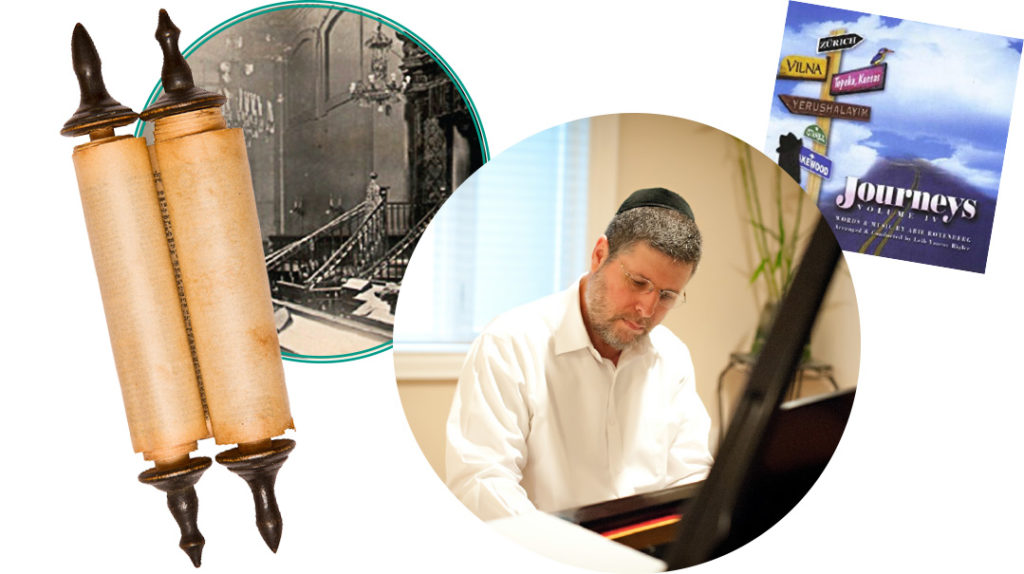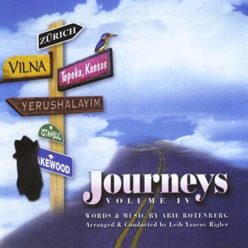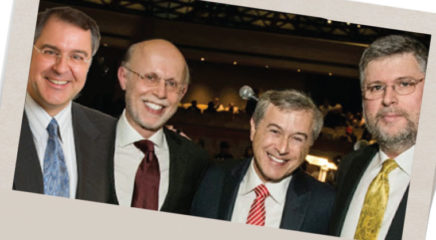“In place of a sefer Torah,” he told the group, “let us carry this child, who represents the future of the Jewish people”
The Man from Vilna
Composed by: Abie Rotenberg; lyrics by Abie Rotenberg & Deborah (Chinskey) Wopniak
Album: Journeys IV
Year: 2003
The Song
Through the haunting blend of the piano’s soft tones and Abie’s raw emotion, one is transported into a bygone world, as seen through the eyes of a war refugee, inspired by the real personality of Rabbi Leo Goldman. Both dread and joy are felt as the song takes its audience on an emotional journey together with war survivors returning to Vilna, looking for some familiar faces. The group of bedraggled refugees realizes that it’s Simchas Torah, and making their way to the old shul, find chaos, destruction, and murder. Yet through the slow and somber sounds of devastation and unimaginable loss, we join them as they discover precious reasons for optimism and rebirth.
The Backstory
Mrs. Rose Brystowski, daughter of Rabbi Goldman
Before World War II, my father was a yeshivah bochur who lived in the town of Koritz, which was then in Poland, near the Russian border. The Russians took that area early in the war, and he was drafted, becoming an officer in the Russian army. A severe wound in the early months of the war meant that he was sent to a hospital in Uzbekistan. There, he met my mother, a Lithuanian refugee, and they married. His wound never healed properly, which actually kept him alive, because the Russian army discharged him from active service.
In the aftermath of the war, my parents made it out of Russia, across the Soviet conquered territories, into Vilna. They were in that city over the Yom Tov of Simchas Torah in 1946, and were drawn to what remained of Vilna’s Great Synagogue. It was a shell of the formerly grand shul, and of course, it had no sifrei Torah, yet the Jews who had gathered there stood in the ruins, prayed the Yom Tov davening and held hakafos. Among the ragtag group of soldiers, refugees, and survivors, my father saw a child, standing hunched on the side. He approached the man who stood near the little boy and asked him if the child was Jewish. “Yes,” was the answer.
My father could hardly believe it. My parents had just traveled thousands of miles, passed through the devastation of countless communities, but he had not caught sight of one Jewish child in all the months of his travels. He asked the father’s permission and picked up the child, holding him close in his arms as he danced. “In place of a sefer Torah,” he told the group, “let us carry this child, who represents the future of the Jewish people.”
My father served as chief rabbi of Norway for some years, until Providence led us to America and his pulpit in Detroit. Until his nineties, he served his people as a rabbi and a chaplain. As a pulpit rabbi, he retold this story frequently. We wondered if it had really happened quite like that, especially as no one ever claimed to be the child in the story.
Then, Abie Rotenberg’s beautiful song came out. Abie never met my father, but somehow, he captured something of his spirit and even his speech in the song. He had heard the story from Rabbi Paysach Krohn, who heard my father recount it.
One night, when I was visiting my father, the phone rang. It was a lady from the Anti-Defamation League, and she asked for Rabbi Goldman. She said, ‘I believe that my boss, Abe Foxman, was the child in the song.’
I was so taken aback.
Abe Foxman had written the story in his memoirs, but it took time for someone to put the two together. When Abe came to see my father, it was very moving for him to see the picture of my father in uniform. That was the tall soldier whom he remembered. That moment in the shul was a pivotal moment in his life, because Abe was hidden with Catholics during the war, and from age eighteen months until he was five years old, he had no idea he was a Jew. He was raised to scorn and spit at Jews. When his parents came out of hiding to reclaim him, his guardian disputed their claim, and so they went to the Russian courts, who, wondrously, upheld the Jewish parents’ claim. That Yom Tov, Abe was with his father in shul in Vilna for the very first time, and after that encounter — sensing my father’s profound feelings of this little child’s importance to Jewish continuity — he told his parents that he liked the Jewish church and wanted to be Jewish.
From the Composer
Although I used poetic license by saying I met the survivor on the plane, and that he was a survivor rather than a Russian soldier, it was definitely Rabbi Goldman who inspired the song. I first learned of his story when a friend overheard him chastising a group at a wedding for complaining about the many simchahs they had to attend. What a powerful message he conveyed to them with his emphatic, “I remember a time when we didn’t know if there would ever be another simchah!” That, and the assurance that Klal Yisrael will endure eternally, are messages that, through this song, were conveyed around the world. When I spoke to Rabbi Goldman after “The Man from Vilna” came out, he was very happy with both the song and its message.
(Originally featured in Mishpacha, Issue 854)




